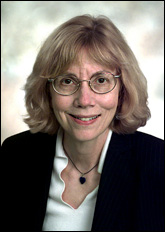Brookhaven Lab's Joanna S. Fowler Named Distinguished Basic Scientist of the Year by the Academy of Molecular Imaging
March 22, 2005
UPTON, NY - Joanna S. Fowler, a senior chemist at the U.S. Department of Energy's Brookhaven National Laboratory, has been named the 2005 recipient of the Distinguished Basic Scientist of the Year Award from the Academy of Molecular Imaging.
The academy promotes the growing field of molecular medicine by building a school of thought, scientific paradigms, and clinical practices related to molecular imaging. This occurs, in part, through educational programs and interactions with government agencies, which are designed to raise awareness and support of molecular imaging.
Fowler, the Director of Brookhaven's Center for Translational Neuroimaging, is being honored for her many career achievements. In 1976, Fowler and her colleagues designed and synthesized a radioactively "tagged" form of sugar that is now used widely to study brain function and also to diagnose and plan treatment for cancer. She also developed another radiotracer, as these "tagged" molecules are called, that first showed that cocaine's distribution in the human brain parallels its effects on behavior.
Another of her major accomplishments was the development of radiotracers to map monoamine oxidase (MAO), a brain enzyme that regulates the levels of other nerve-cell communication chemicals. Using these radiotracers, she discovered that smokers have reduced levels of MAO in their brains. This may account for some of the behavioral and epidemiological features of smoking, such as the high rate of smoking in individuals with depression and drug addiction, two conditions involving poor nerve-cell communication.
"It has been a privilege for me to be associated with an outstanding group of collaborators throughout my career and to have the longstanding support of the Department of Energy, which has nurtured the development of new imaging technologies that have had a major impact on human health," Fowler said. "I am especially dedicated to using imaging to understand addictive disorders, which place an enormous burden on families and on the health care system."
The imaging technologies used in Fowler's studies are a direct outgrowth of the Department of Energy's long-standing investment in basic physics and chemistry research. Through work on accelerators designed to answer questions about the fundamental nature of matter and energy, pioneering DOE scientists understood and realized the potential to develop these miraculous tools for the diagnosis and treatment of disease. The ongoing research using these tools to investigate drug addiction and other diseases of the brain is a prime example of how our national laboratories bring together the expertise of chemists, physicists, and medical professionals to address questions of profound significance for society.
Fowler received her Ph.D. in chemistry from the University of Colorado and did her postdoctoral work at the University of East Anglia in England and at Brookhaven. She is also an Adjunct Professor in the Chemistry and Biomedical Engineering departments at Stony Brook University.
In 2003, Fowler was elected to the National Academy of Sciences. Her numerous other honors include the American Chemical Society's Glen T. Seaborg Award for Nuclear and Radiochemistry (2002), the Society of Nuclear Imaging in Drug Development's Alfred P. Wolf Award (2000), the Department of Energy's E.O. Lawrence Award (1999), and the Francis P. Garvan-John M. Olin Medal in 1998.
2005-10291 | INT/EXT | Newsroom










